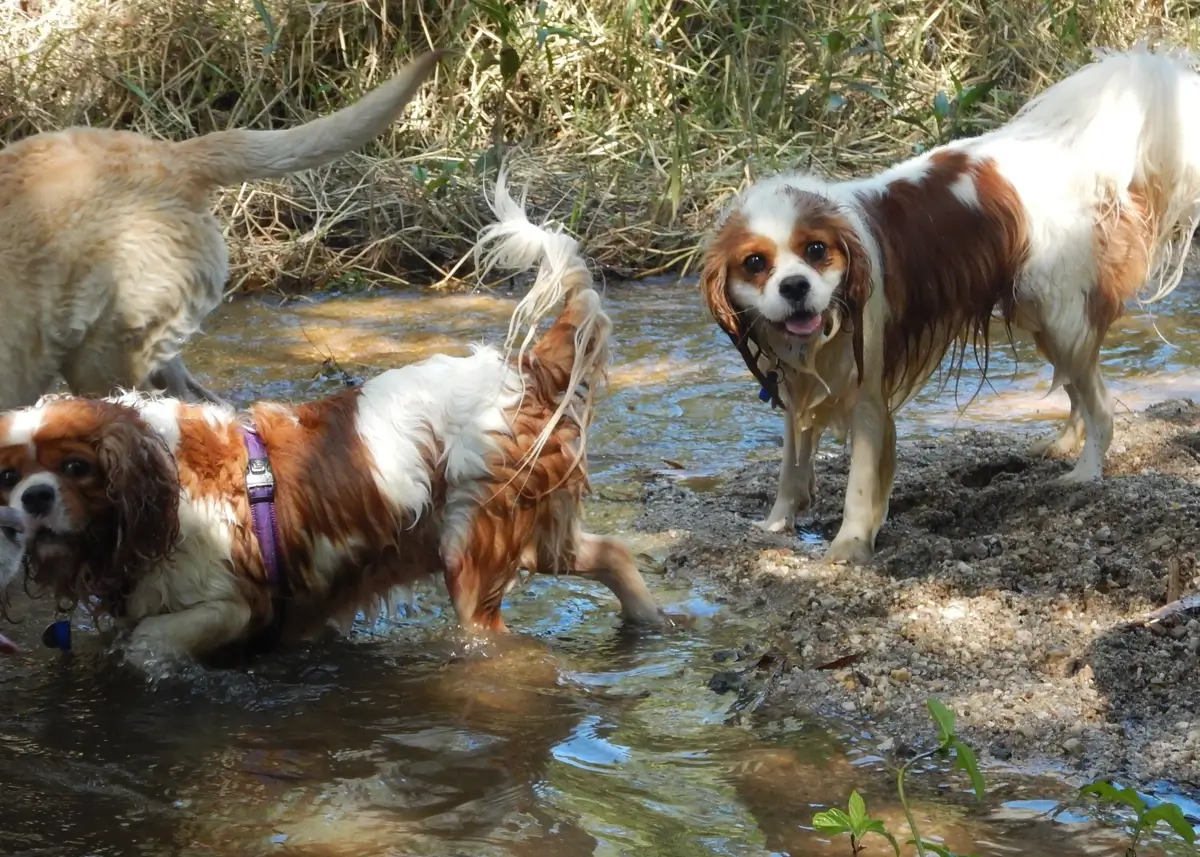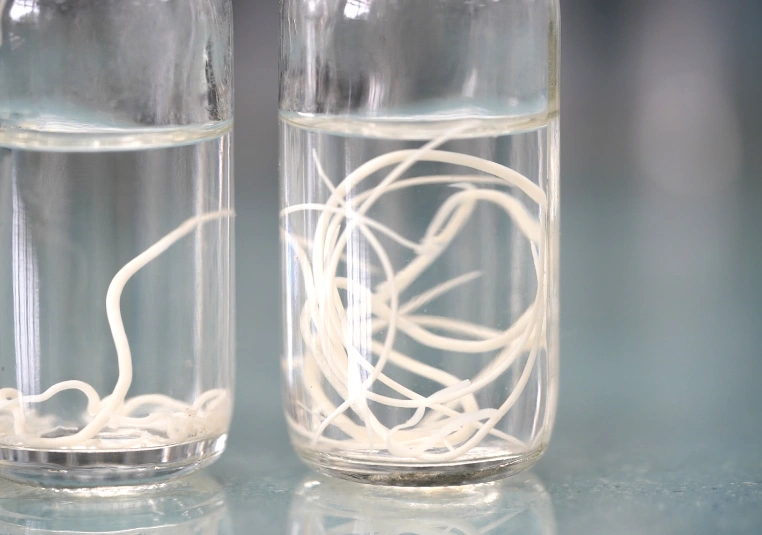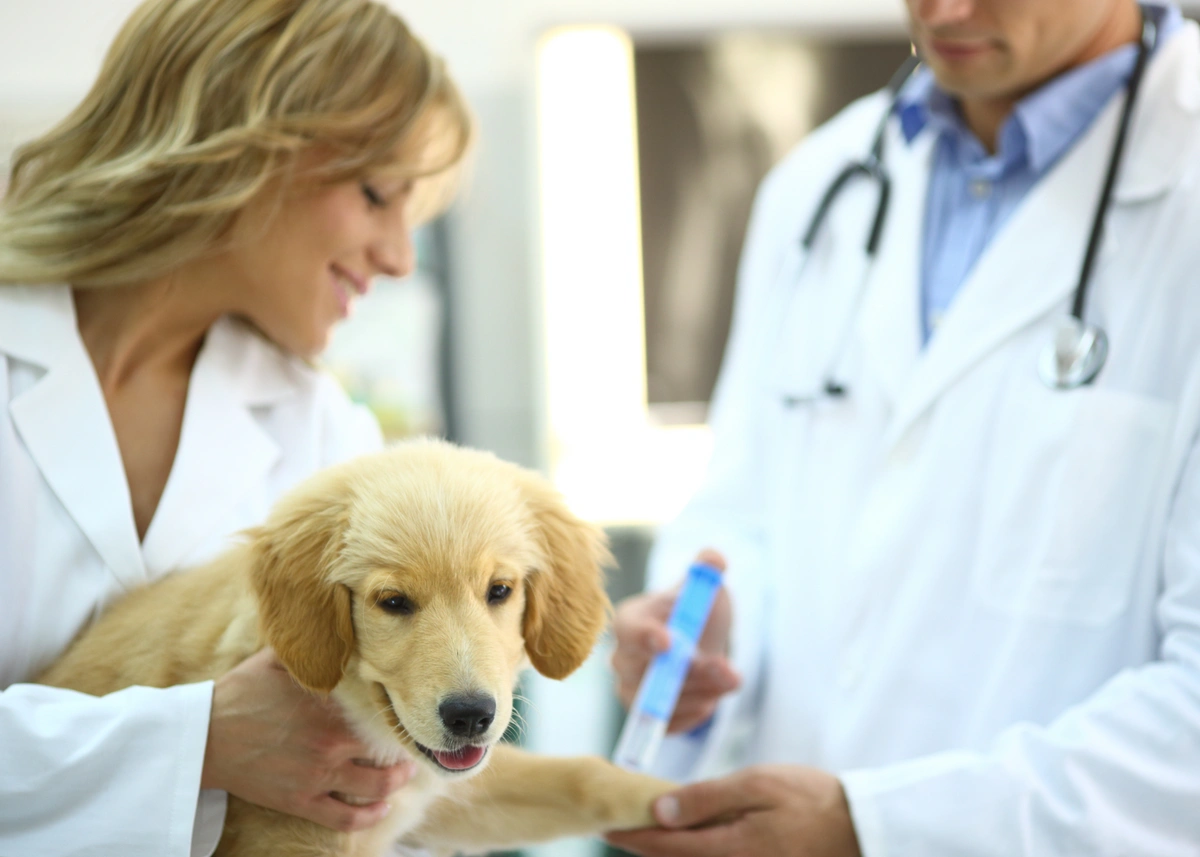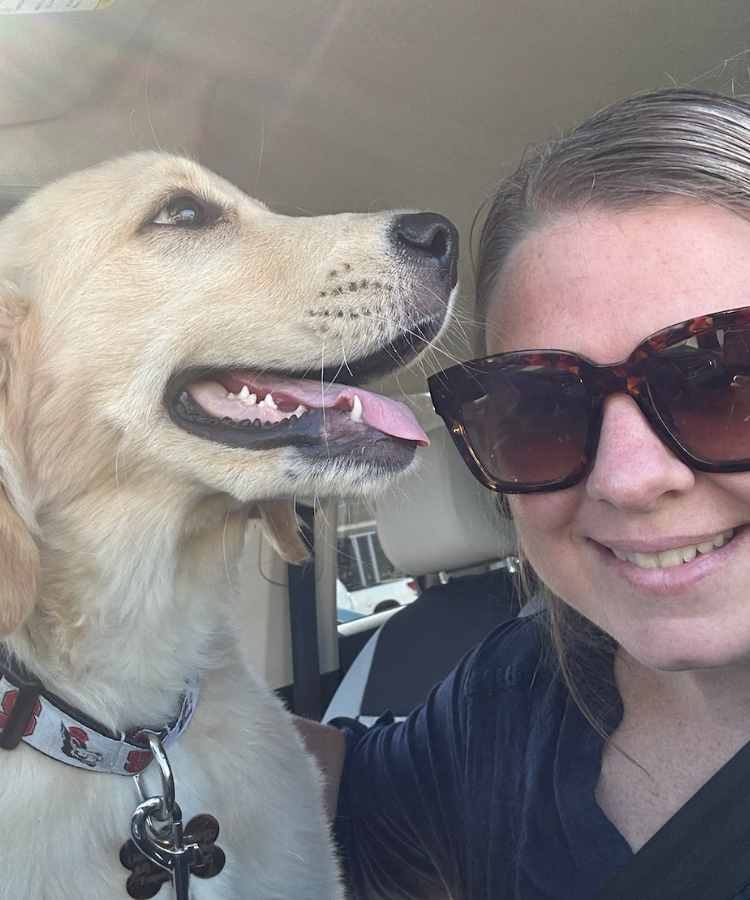“Aww, how cute! Look at Fido romping around on the nature trail! He is just sniffing everything he can! OH NO! Fido, NO! Get away from that!”
As you run toward your puppy you’re walking on a long lead, you see a brown substance on his little face. You dread what’s coming next because you’re pretty sure what Fido just sampled but are thinking, “Say it ain’t so!” Your first thought may be how to clean it up, but your second thought needs to be about your puppy’s health – worms.
Puppies are curious and get into everything they can. You may think they have an uncanny ability to find the nastiest thing to eat as fast as they can, making you wonder, “Why do puppies eat poop and other gross substances?” You have to watch them like a hawk because they’ll get into something before you can spy it yourself!
Unfortunately, their curious nature can have serious health consequences if your puppy eats something containing certain types of parasites, resulting in a myriad of different types of worms.
Learn about the basics of deworming your puppy, how to choose a puppy deworming schedule, which worms to watch out for, and how to treat worms in puppies.
How Did My Puppy Get Worms?
Worms do not just show up naturally in a puppy – they have to contract it from somewhere. Even if we watch our puppy’s every move, it’s possible we can’t know the source since worms have the potential to be literally everywhere, which is why prevention is the best policy when dealing with worms in puppies.
Most sources of worms will be located from the outside, but that is not always the case. We don’t want to deter you from bringing puppies outside, but knowing sources of worms will help you be more aware when taking your puppy on an outdoor adventure.
Throughout their lifetime, dogs can pick up worms from:
- Mosquito, flea, or tick bites
- Eating infected prey like birds, rodents, reptiles, or other dead animals
- Ingesting contaminated mother’s milk when nursing
- Coming into contact with infected soil, body fluid, or excrement
- Close contact with infected dogs
- Swallowing infected fleas
What Types of Worms Should I Worry About?
Even if you’re deworming your puppy on a schedule, you’ll still need to know the types of worms that can affect your puppy. Most worm infections share common traits: contaminated eggs or larvae enter the body via soil, waste, or body fluids, undergo a cyclical journey inside your puppy’s body, and conclude the cycle by continuing to ingest contaminated substances until the cycle is broken via medication and treatment.
Roundworm
Roundworms are intestinal parasites contracted through infected dirt and feces. They often give a puppy a pot-bellied appearance because the worms can grow up to 12 cm long and look like spaghetti strands. Called Toxocara canis and Tocascaris leonin, roundworms begin by infecting the intestinal tract and can move to other organs, including the lungs.
Whipworm
Whipworm, called Trichuris vulpis, is a parasitic worm about ¼ inch long with a thicker front end and thin, long back end that looks just like a whip. They like to hang out in the large intestine until they burrow into intestinal walls and move to other organs. One gross fact is these eggs can live up to 3-5 years in soil just waiting for curious puppies.
Hookworm
Hookworms go by the names Ancylostoma caninum, Ancylostoma braziliense, and Uncinaria stenocephala. These nasty parasites are named after the hook-like mouth at one end they use to burrow into the small intestine and are about as long as the diameter of a penny. You can reduce roundworm infestations by picking up dog waste, covering sandboxes, and deworming on a schedule.
Tapeworm
Tapeworms are another type of parasite a bit different than the other worms as far as origin but are just as serious as other worm infections. Called Dipylidium caninum, tapeworms in puppies are typically transmitted by fleas. Your puppy could swallow a tiny flea infected with tapeworms or pick up worms from eating infected matter.
Tapeworms are flat, ivory-colored worms composed of tiny segmented sections, each one the dimension of a grain of rice. These parasites attach themselves to the inner linings of your dog's intestinal tract with hook-shaped suckers and continue their life cycle safely inside your puppy. Preventing flea infestations in your puppy is a great way to curtail tapeworm infections.
Heartworms
One frequently discussed peril for puppies is a heartworm infection, a grave ailment fraught with significant implications such as heart failure, profound pulmonary afflictions, other forms of organ harm, and potentially fatal outcomes.
Heartworm infestation begins when a mosquito, bearing infective heartworm larvae scientifically known as Dirofilaria immitis, bites your puppy. These larvae navigate through your puppy's body, ultimately lodging themselves within the heart, lungs, and interconnected blood vessels. Maturing within the bloodstream, the heartworms adopt a resemblance to slender strands of cooked spaghetti as they fulfill their life cycle.
We have a whole article on heartworm prevention since it can stand on its own as one of the common illnesses puppies should be protected against.
Pinworms and ringworm
Luckily, dogs do not get pinworms like humans can. In addition, ringworm is not technically a worm and is instead a fungal infection, so deworming a puppy does not have anything to do with contracting pinworms or ringworm.
Signs of a Worm Infection in Puppies
If you suspect your puppy has worms, definitely call your veterinarian right away for treatment, and commit to a deworming schedule if you haven’t done so already.
Your puppy may experience the following symptoms if they have worms:
- Chronic diarrhea
- Distented or protruding belly
- Visible worms in stool
- Blood in stool
- Weight loss
- Dehydration
- Abdominal pain
- Pneumonia
- Coughing or trouble breathing
- Pale gums
- Exercise intolerance
- Intestinal blockage
- Lethargy
- Dull or poor coat
- Anemia
How Do I Prevent Worms in My Puppy?
Preventing worms from entering your puppy’s mouth is one important way to stop worm issues before they start. Pick up any waste that you see and dispose of it properly so no other animals can come in contact with it.
Keep your puppy on a leash when exploring nature and be aware and present as you are walking to anticipate what your puppy may be drawn to.
Wild and domesticated animals like to think that sandboxes are perfect litter boxes, so be sure to cover your kids’ sandboxes as well.
Your puppy will need to be up-to-date on flea, tick, and heartworm prevention to kill any parasites they may come in contact with.
Finally, the absolute best way to prevent worm infestations is to follow a deworming schedule that is best for your puppy as recommended by a licensed trusted veterinarian.
When Should I Deworm My Puppy?
Part of being a responsible puppy owner is immediately continuing with a deworming schedule for your puppy that your breeder and veterinarian recommend.
Deworming treatment should be done at 2, 4, 8, and 12 weeks of age followed by 4, 5, and 6 months of age. Puppies should always be on a regular flea, tick, and heartworm preventative as well.
Puppy owners have various available options for how to deworm puppies. Veterinarians will choose a dewormer based on the age of your puppy, your puppy’s breed, weight, and other factors they will discuss with you.
Dewormers can be soft chews, liquids, tablets, pills, or injections. If you are administering them yourself, always read the instructions and follow the directions given to you.
Will I Need to Deworm My Pawrade Puppy?
When you buy puppies for sale from Pawrade, you can rest assured knowing all our puppies have begun their deworming on a schedule as recommended by your breeder’s licensed veterinarian. You’ll receive these documents (along with several others) when your puppy arrives.
Regular veterinary care is one of the cornerstones of good health for your puppy. Before your puppy arrives, you should interview and choose the best veterinarian for your puppy. Ask lots of questions, read reviews, and go with your gut. You can also know how they schedule their appointments, and go ahead and clear your calendar to include the first vet visit.
When your Pawrade puppy arrives, you’ll need to take your puppy in for a wellness/baseline exam by a licensed veterinarian within the first three (3) calendar days (72 hours) at a vet practice that is not Banfield. We have found that “big-box” veterinarians often do not have specialized puppy knowledge and will push unnecessary treatments on customers, costing thousands of dollars in the long run for “issues” that are truly non-issues.
You’ll be able to present the documents your puppy came with, and your veterinarian will recommend core vaccinations for puppies and a deworming schedule based on what your puppy has already received. Then, as a responsible pet owner, you’ll provide the follow-up doses as recommended and purchase any preventative products needed.
Select a Healthy Pawrade Puppy
All of our Pawrade puppies come with a comprehensive health guarantee that puts the puppy’s health first and foremost with protections for both the breeder and you as a puppy pawrent.
To find healthy puppies for sale, browse through our variety of dog breeds and let our Puppy Concierge know which one you’d like to have worm your way into your heart as your furever friend!




